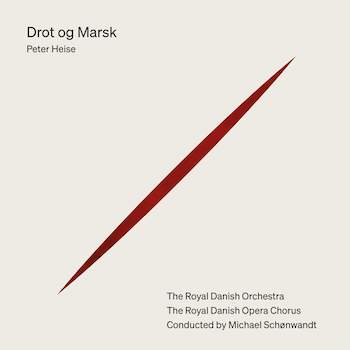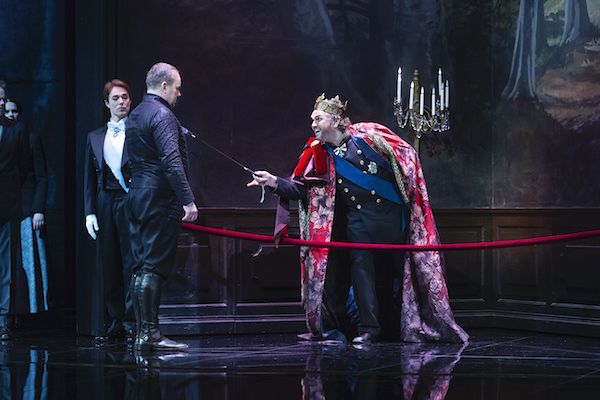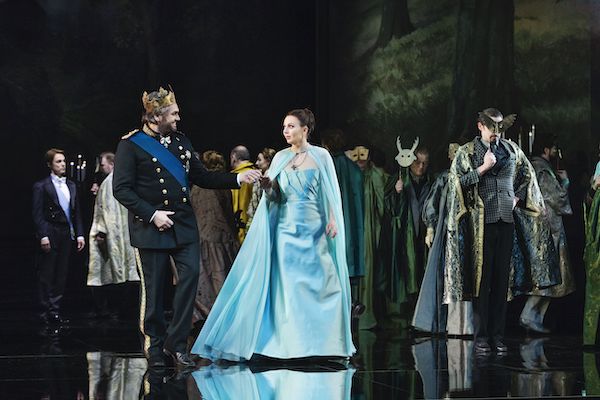Opera Album Review: Great Dane! A Revered Verdian Opera From Denmark
By Ralph P. Locke
Peter Heise’s King and Marshal (1878), one of the most-performed Danish operas, is melodic and atmospheric, here sung and played persuasively.
Peter Heise: Drot og Märsk (King and Marshal)
Sofie Alkjaer Jensen (Aase), Sine Bundgaard (Lady Ingeborg), Gert Henning-Jensen (Rane Johnsen), Peter Lodahl (King Erik “Klipping”), Johan Reuter (Stig Andersen).
Royal Danish Orchestra and Royal Danish Opera Chorus, cond. Michael Schønwandt.
DaCapo 6.200006 [3 CDs] 153 minutes
To order or to hear a portion of each track, click here.
 Peter Heise (1830-1879) was a Danish composer of real accomplishment, best known as a master of Danish art song. Record magazines have made note of previous CDs of works by him: primarily songs, plus choral and chamber works. Drot og märsk, a four-act “tragic opera,” was previously made available in a recording on the Chandos label, led by the same conductor, Michael Schønwandt. It featured the always-astonishing bass Aage Haugland and is still available as a download and on streaming services. Perhaps used copies can be found. If not, the new recording will, I suspect, serve just as well, and it is a strong one.
Peter Heise (1830-1879) was a Danish composer of real accomplishment, best known as a master of Danish art song. Record magazines have made note of previous CDs of works by him: primarily songs, plus choral and chamber works. Drot og märsk, a four-act “tragic opera,” was previously made available in a recording on the Chandos label, led by the same conductor, Michael Schønwandt. It featured the always-astonishing bass Aage Haugland and is still available as a download and on streaming services. Perhaps used copies can be found. If not, the new recording will, I suspect, serve just as well, and it is a strong one.
King and Marshal has been often performed at the Royal Theater in Copenhagen since Heise’s day, making it perhaps the most famous Danish opera, aside from two by Carl Nielsen (Saul and David and Maskarade). Its plot involves a love pentangle. There is, as in Verdi’s Un ballo in maschera (1859), a rather debonair ruler (tenor) who desires a woman of deep feeling (spinto soprano) who is the wife of a prominent and principled nobleman (baritone). The names here are King Erik, Lady Ingeborg, and Marshal Stig.
But this king is more heartless than Verdi’s Riccardo. The role is based on the 13th-century king Eric V, who was (history tells) murdered in a country barn that was then set on fire. Erik has long been known by the nickname Klipping, because he shortchanged his people in a variety of ways. The term “klipping” derived from the practice of cutting small pieces off of coins, thereby reducing their value.
The main plot is set in motion toward the end of Act 1, when Marshal Stig leaves Ingeborg in the care of Erik and goes off to lead the royal troops in an assault on the Swedish army. Entrusting Ingeborg to Erik is unwise, given the king’s roving eye. In Act 2, it becomes clear that he has raped Ingeborg, though he insists that she yielded willingly.
The central three-character plot is enriched by what I take to be a younger, more innocent couple: the king’s quartermaster Rane (lyric or character tenor) and Aase, daughter of a charcoal-burner (light soprano). In the middle of Act 1, the king woos Aase (with whom Rane has previously sung a tuneful love duet) and gains her trust. This turns Rane against him.
Rane ends up assisting Stig and others in a conspiracy to ambush King Erik. They succeed and kill him. Aase arrives with the king’s sword (which he has left behind in her hut, during a second visit to her), but too late. She holds the sword perpendicular to the ground, making it resemble a cross. Village folk sing “Now stands the country in peril,” monks chant “Requiem aeternam,” and the curtain falls.
In musical terms, especially in Act 1, the work sometimes feels like a bland and obedient copy of features of operas that had been in the international repertory for decades, especially German-language works such as Weber’s Der Freischütz and Marschner’s Hans Heiling. (The latter has recently received a fine new recording.) The harmony can be plain, the phrase structure square. But I may be overreacting, as critics often do, when a work seems not to be following the most “progressive” trends of its day, such as (in this case) the harmonic innovations of Wagner.
Indeed, as the opera continues, King and Marshal kicks into gear, the music repeatedly grabbing my attention. I particularly enjoyed many passages in which the music eerily reflects the libretto’s highly rhythmic style poetic style, derived from Danish folk ballads: “Why silent [are] you, my housewife brave? / Why fly you [to] me not near?”

A scene from the Royal Danish Orchestra and Royal Opera Chorus production of King and Marshal. Photo: © Miklos Szabo
(The translators of the libretto have taken care to maintain a close sense of the poetry’s word-rhythm, but helpfully insert in brackets extra words that help clarify the meaning. They also pointedly create compound nouns that echo the Danish words directly, e.g., “at every windpuff the leaves fall.” Thus the word “housewife” in the lines quoted above evokes the sanctity of the family home.)
At certain moments, music and dramatic situation interlock powerfully. The Act 2 duet between Stig and Ingeborg that contains the “housewife” lines just quoted ends with a very effective cabaletta, much in the spirit of, say, Verdi’s Il trovatore (1853) and strong enough that I didn’t at that moment remotely worry about whether the passage was derivative or not. The finale to Act 2, with everybody on stage crying out their various fears and curses, likewise works up some dramatic heat, as does the scene of the conspirators in Act 3, with its mingled cries of vengeance from Ingeborg, Rane, Marshal Stig, and the other men vowing to disguise themselves in gray hooded monks’ cloaks.
The atmosphere of a scene is often limned in a short orchestral prelude, as in the creepy chromatic lines that, at the beginning of Act 4, introduce us to the gathering of conspirators in the woods. And a subsequent scene in Act 4, in which Aase defends herself against the king by brandishing an axe, makes a potent feminist statement, thanks in large part to Heise’s highly dramatic music.
In short, Heise could definitely write effective opera at times! This is not a song composer out of his depth (as critics rightly complain in regard to the musically rich but dramatically plodding operas of Schubert). It is sad that he died at 49, a year after writing King and Marshal.

A scene from the Royal Danish Orchestra and Royal Opera Chorus production of King and Marshal. Photo: © Miklos Szabo
The overture is wonderfully colorful. Heise based it on a somewhat longer overture that he wrote 24 years earlier, in response to a play on the same topic as his eventual opera. In one version or the other, this orchestral piece might serve well in a symphony concert.
The recording, taken from three staged performances in April-May 2019, is lively and powerful. The singers are all highly capable and youthful-sounding — no tired vocal production here! I was particularly captivated by the impressive vocal and interpretive range of Johan Reuter as Marshal Stig, though he, unlike any of the others, often sings slightly under pitch. (He is the Kurwenal on Marek Janowski’s much-praised recording of Tristan.)
The booklet contains a helpful essay and the libretto, both of them in Danish and in clearly thought-out English, and evocative photos of the stage production. A small gripe: the offstage horn-calls in the first scene of Act 2 should have been mentioned in a stage direction in the libretto. Somebody reading the libretto on its own may well wonder why the mood of the various characters suddenly shifts without apparent cause.
All in all, this is a welcome effort at bringing back a work that was and remains historically important for Danish musical life. Are there other equally accomplished and imaginative Danish works to which the rest of the world has had little access? Perhaps shorter comic ones, which so often are easier for a composer to manage than a grand opera such as King and Marshal? I’d dearly like to hear Heise’s singspiel The Pasha’s Daughter, written when he was 39 and already very experienced at composing vocal music.
Ralph P. Locke is emeritus professor of musicology at the University of Rochester’s Eastman School of Music. Six of his articles have won the ASCAP-Deems Taylor Award for excellence in writing about music. His most recent two books are Musical Exoticism: Images and Reflections and Music and the Exotic from the Renaissance to Mozart (both Cambridge University Press). Both are now available in paperback; the second, also as an e-book. Ralph Locke also contributes to American Record Guide and to the online arts-magazines New York Arts, Opera Today, and The Boston Musical Intelligencer. His articles have appeared in major scholarly journals, in Oxford Music Online (Grove Dictionary), and in the program books of major opera houses, e.g., Santa Fe (New Mexico), Wexford (Ireland), Glyndebourne, Covent Garden, and the Bavarian State Opera (Munich). The present review first appeared in American Record Guide and appears here with kind permission.
Tagged: DaCapo, King and Marshal, Michael Schønwandt, Peter Heise, Ralph P. Locke

[…] Recordings Opera Album Review: Great Dane! A Revered Verdian Opera from Denmark Peter Heise’s King and Marshal (1878), one of the most-performed Danish operas, is melodic and atmospheric, here sung and played persuasively. artfuse.org […]
[…] Danish operas: August Enna’s Kleopatra (1894, based on the English novel by H. Rider Haggard) and Peter Heise’s Drot og Marsk (King and Marshal, 1878). We got a fine new recording of the best-known Polish opera, Moniuszko’s Halka and of the […]